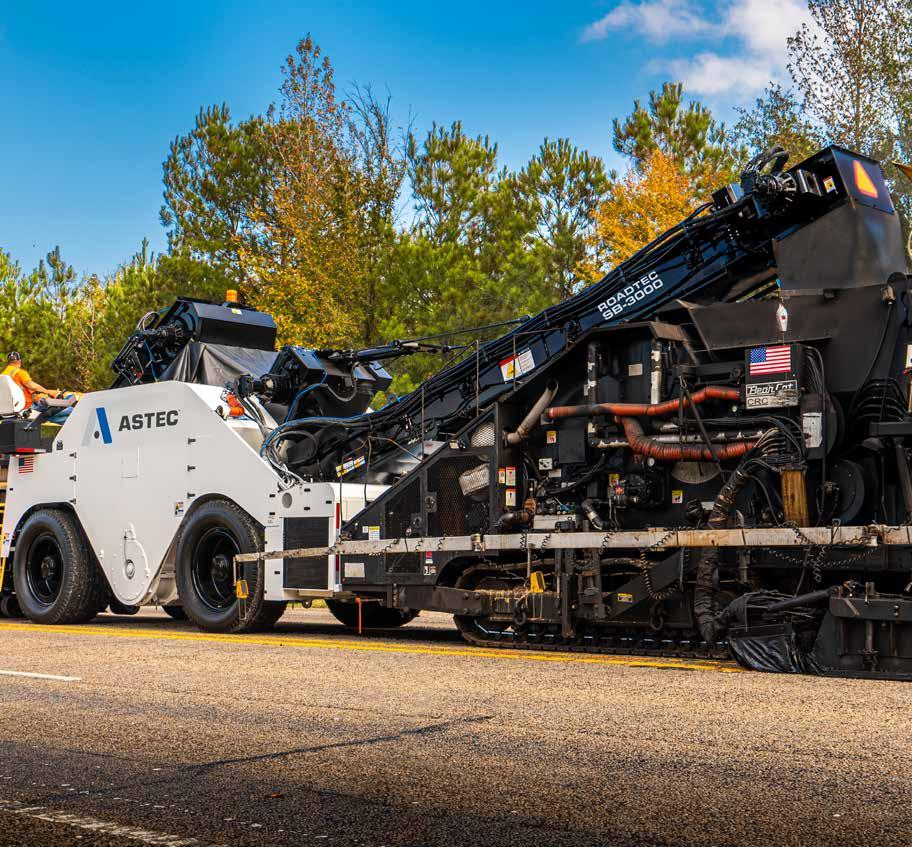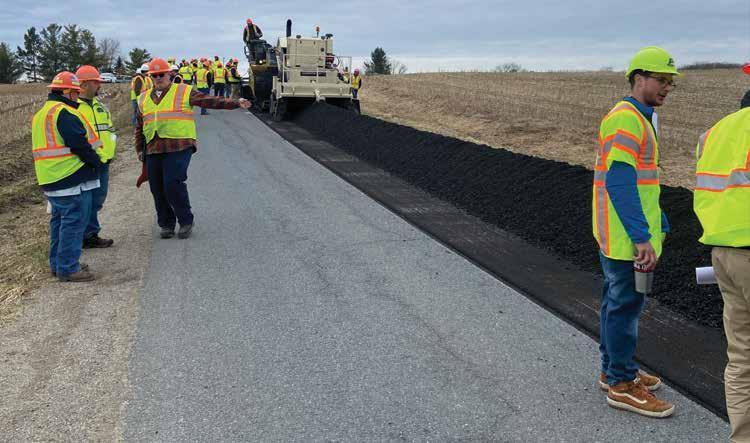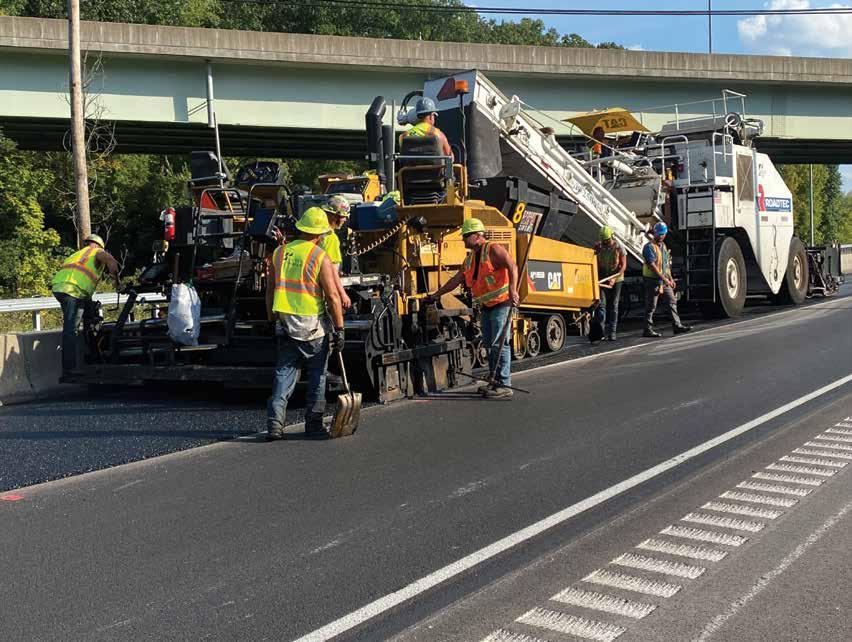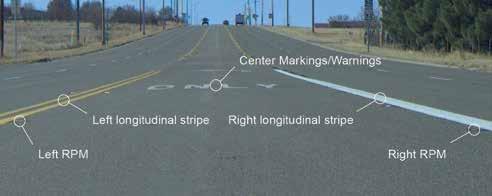
6 minute read
Here’s How Farm Progress Show Refreshed RAP
The process to incorporate Biomag Easy Pave from Colorbiotics atop asphalt millings involves spray-applying the topical solution. This image shows the process on a parking area in Columbus, Ohio, after the crew first loosened 2 to 3 inches of gravel. All photos courtesy of Colorbiotics
HERE’S HOW FARM PROGRESS HERE’S HOW FARM PROGRESS SHOW REFRESHED RAP SHOW REFRESHED RAP
TBY ALEXANDRA ZAHN The rising cost of crude oil, mixed with changing environmental regulations, is making asphalt applications less profitable for contractors. Within the past two years, asphalt pavement has doubled in price from $45 per ton to $80–$90 per ton, as of early September 2022. One solution to this problem is reducing the percentage of virgin liquid asphalt cement (AC) needed in asphalt applications by increasing the use of reclaimed asphalt pavement (RAP). According to the National Center for Asphalt Technology (NCAT), there are many benefits to using RAP in asphalt mixes—including materials cost savings, conserving natural resources, and reducing energy consumption and the associated greenhouse gas emissions.
However, increasing the amount of RAP used in asphalt mixes can increase its susceptibility to cracking and may cause durability issues if the contractor doesn’t consider its age or a restorative agent. There are now new solutions on the market in the cold-in-place space that address these concerns. Colorbiotics has introduced
Biomag™ Easy Pave, a soybean-based topical additive.
“We’re excited to offer a solution that allows contractors to increase cost efficiency in such a unique way,” said Austin Hohmann, product manager at Colorbiotics. “Hot mix can run about $4 per square foot, but this product paired with using RAP will cost only $0.60 per square foot. And this could easily go up by a dollar as the price of RAP varies dramatically.”
While still new to the market, Biomag Easy Pave has already been put to work in the real world. “We are always interested in gathering more data about our products and their performance,” Hohmann said. One of the first applications of Easy Pave was to help prepare the site for the largest U.S. outdoor farm event: the Farm Progress Show in Boone, Iowa.
Before the show is hosted in Boone every other year, the organizers survey the Central Iowa Expo showgrounds and determine what improvements need to be made. This can include anything from grounds maintenance to building upgrades. This year, the dirt area reserved for the varied industries tent was due for a facelift.
“In the past, we would put down wood chips to control the dust and mud inside the tent area,” said Matt Jungmann, events director
THE TANK
100 YEARS OF DOING IT BETTER
WE ARE A UL-142, ASME SECTION
VIII AND API APPROVED TANK
MANUFACTURER. Our facility is quality control inspected by
Underwriter’s Laboratories four times per year.
WE ARE A LICENSED MANUFACTURER
FOR THE STEEL TANK INSTITUTE (STI). We are the recipient of STI’s
Quality Award 16 consecutive years and inspected two times annually.
ALL ASPHALT TANKS ARE BUILT
TO THE UL-142 CONSTRUCTION
CODE. We keep records of the steel purchases, welding practices, pressure tests and other quality control measures.
WE USE 6” INSULATION ON TOP
AND SIDEWALLS OF OUR TANKS.
The bottom of our tanks are insulated with foam glass block.
ALL OF OUR SHELL JOINTS ARE
DOUBLE BUTT WELDED AND NOZZLE
JOINTS SEAL WELDED INSIDE AND
OUT. 100% Welded - The strongest union of two pieces of steel possible.
WE ARE CONSTANTLY IMPROVING
OUR TANK DESIGNS. The only way to keep our tanks better than any other tank on the market!


Call us toll free! (888) 333-0323
www.meekerequipment.com
Your Preferred Asphalt Equipment Resource Contact Information
Meeker Equipment Headquarters 4381 Front Mountain Road Belleville, PA 17004 Phone: (717) 667-6000 Fax: (717) 935-2389 E-mail: info@meekerequipment.com

An asphalt crew spread millings at the Central Iowa Expo site in Boone, Iowa, to prepare for the Farm Progress Show.
The crew finished compacting the last layer of asphalt millings topically treated by Colorbiotics’ Easy Pave product.
The Colorbiotics asphalt project elevated the varied industries tent space for the exhibitors at the Farm Progress Show.


for Farm Progress. “When the idea of paving at the showgrounds was presented to us, we immediately thought that the varied industries tent would be the perfect place. We knew we’d get maximum value out of improving that spot.”
Simply having a paved area would improve the guests’ experiences and allow for more engagement within the space. “We would have continued to put down wood chips and scrape them up after the show. This is a much better alternative,” Jungmann said.
Biomag Easy Pave is recommended for use on low-volume roadways, including parking lots, gravel roads and driveways. This makes it an ideal solution for the showgrounds, as it can easily withstand foot traffic.
The application process for Biomag Easy Pave includes three steps. 1. Spread a layer of asphalt millings. 2. Spray the area with the topical solution. 3. Compact the treated millings.
“The topical agent we apply uses water as a transport vehicle to get the material down,” Hohmann explained. “It is almost like a tack weld, binding the points at which the millings connect.”
For the Farm Progress Show project, crews put down a 6-inch layer of asphalt millings at the site and then spray-applied the Easy Pave solution followed closely by an asphalt compactor.
The millings used for this project were a mixture of excess RAP from a variety of road types like old, low-volume roads, sections of an interstate, and even main roadways in a city. Traditionally, RAP from high-volume roads is more desirable due to the added polymers that strengthen the asphalt. But this high-volume RAP is also more expensive.
“Fortunately, Easy Pave not only seals the surface of aging asphalt, it also penetrates deeper to help restore the micro-fractures,” Hohmann said. “Because of this, we’re able to use the ‘less desirable’ RAP from low-volume projects for this application, which is more cost-efficient.”
After testing the application, the Farm Progress site showed a compaction of 4-5% air voids, meaning it has the same density as a typical roadway. The ability to use recycled materials while still achieving the same end result is key for widespread industry adoption.
While using renewable materials benefits asphalt applications, using soy-based ingredients in Biomag Easy Pave benefits more than one industry. Finding innovative ways to use crops also benefits the agriculture sector and helps reduce waste.
Easy Pave’s soy-based formulation is an alternative to petroleum or formaldehyde-based products because it is considered safe for the environment and more carbon neutral. This is especially important when applying to roads that can have run-off into nearby ditches or grassy areas.
Renewable products are a growing preference in the pavement industry, especially as technology continues to advance and new breakthroughs are achieved. Colorbiotics has developed multiple asphalt products using soy, including Biomag Easy Pave, Invigorate™ Additive and Invigorate™ Topical, that are designed to provide improvements to the molecular makeup of asphalt.
“We take pride in developing products that push the boundaries of what’s been done traditionally,” Hohmann said. “With solutions like these, contractors can make pavement that is good for the planet and even better for their bottom line.”
LEARN MORE
Here’s How to Pave with Biomag™ Easy Pave by Colorbiotics.
1. Spread a layer of asphalt millings. 2. Spray the area with the topical solution. 3. Compact the treated millings.












